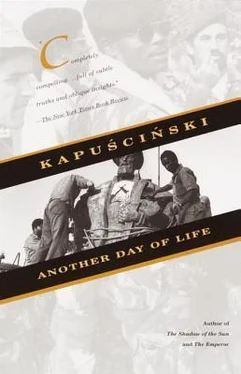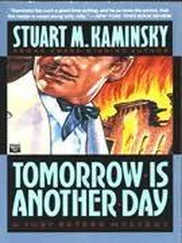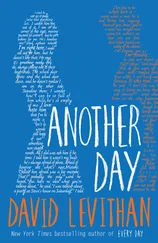ARyszard Kapuściński
Another Day of Life!
O Lord!
Despite a great many prayers to You we are continually losing our wars. Tomorrow we shall again be fighting a battle that is truly great. With all our might we need Your help and that is why I must tell You something: This battle tomorrow is going to be a serious affair. There will be no place for children. Therefore I must ask You not to send Your Son to help us. Come Yourself.
— the prayer of Koq, leader of the Griquas tribe, before a battle with the Afrikaners in 1876
We are human beings.
When fear comes, sleep seldom can.
Not everyone can do everything.
The sailor talks about wind; the farmer, about cattle;
the soldier, about wounds.
As long as I breathe, I hope.
Life is vigilance.
There is no life in war.
Man is a wolf to man.
In the gardens of Bellona are born the seeds of death.
The outcomes of battles are always uncertain.
He who can prevail over himself in victory is twice victorious.
You know how to win, Hannibal, but not how to take
advantage of victory!
The only salvation for the conquered: not to expect salvation.
Being conquered, we conquered.
Who was he, who first took up the fearsome swords?
ABBREVIATIONS
FNLA National Front for the Liberation of Angola, led by Holden Roberto and backed by the Western powers and Zaïre.
MPLA Popular Movement for the Liberation of Angola, led by Agostinho Neto and backed by the Soviet Union and Cuba.
UNITA National Union for the Total Independence of Angola, led by Jonas Savimbi and backed by the Western powers and South Africa
PIDE Portuguese political police
PAP Polish Press Agency
This is a very personal book, about being alone and lost. In summer 1975 my boss — at the time I was a correspondent for a press agency — said, “This is your last chance to get to Angola. How about it?” I always answer yes in such situations. (The reason he asked me the way he did was that a civil war which continues to this day was already under way. Many were convinced that the country would turn into a hell — and a closed hell at that, in which everyone would die without any outside help or intervention.) The war had begun in the spring of that year, when the new rulers of Portugal, after the overthrow of the Salazar dictatorship, gave Angola and Portugal’s other former colonies the right to independence. In Angola there were several political parties— armed to the teeth — doing battle with one another, and each of these parties wanted to take power at any price (most often, at the price of their brothers’ blood).
The war these parties waged among themselves was sloppy, dogged, and cruel. Everyone was everyone’s enemy, and no one was sure who would meet death. At whose hands, when, and where. And why. All those who could were fleeing Angola. I was bent on going there. In Lisbon I convinced the crew of one last Portuguese military aircraft flying to Angola to take me along. More precisely, I begged them to take me.
The next morning I saw from the window of our descending plane a motionless white patch surrounded by the sun. It was Luanda.
We’re Closing Down the City

ANGOLA in 1975
For three months I lived in Luanda, in the Hotel Tivoli. From my window I had a view of the bay and the port. Offshore stood several freighters under European flags. Their captains maintained radio contact with Europe and they had a better idea of what was happening in Angola than we did — we were imprisoned in a besieged city. When the news circulated around the world that the battle for Luanda was approaching, the ships sailed out to sea and stopped on the edge of the horizon. The last hope of rescue receded with them, since escape by land was impossible, and rumors said that at any moment the enemy would bombard and immobilize the airport. Later it turned out that the date for the attack on Luanda had been changed and the fleet returned to the bay, expecting as always to load cargoes of cotton and coffee.
The movement of these ships was an important source of information for me. When the bay emptied, I began preparing for the worst. I listened, trying to hear if the sound of artillery barrages was approaching. I wondered if there was any truth in what the Portuguese whispered among themselves, that two thousand of Holden Roberto’s soldiers were hiding in the city, waiting only for orders to begin the slaughter. But in the middle of these anxieties the ships sailed back into the bay. In my mind I hailed the sailors I had never met as saviors: it would be quiet for a while.
In the next room lived two old people: Dom Silva, a diamond merchant, and his wife, Dona Esmeralda, who was dying of cancer. She was passing her last days without help or comfort, since the hospitals were closed and the doctors had left. Her body, twisted in pain, was disappearing among a heap of pillows. I was afraid to go into the room. Once I entered to ask if it bothered her when I typed at night. Her thoughts broke free of the pain for a moment, long enough for her to say, “No, Ricardo, I haven’t got enough time left to be bothered by anything.”
Dom Silva paced the corridors for hours. He argued with everyone, cursed the world, carried a chip on his shoulder. He even yelled at blacks, though by this time everybody was treating them politely and one of our neighbors had even got into the habit of stopping Africans he didn’t know from Adam, shaking hands, and bowing low. They thought the war had got to him and hurried away. Dom Silva was waiting for the arrival of Holden Roberto and kept asking me if I knew anything on that score. The sight of the ships sailing away filled him with the keenest joy. He rubbed his hands, straightened up, and showed his false teeth.
Despite the overwhelming heat, Dom Silva always dressed in warm clothes. He had strings of diamonds sewn into the pleats of his suit. Once, in a flush of good humor when it seemed that the FNLA was already at the entrance to the hotel, he showed me a handful of transparent stones that looked like fragments of crushed glass. They were diamonds. Around the hotel it was said that Dom Silva carried half a million dollars on his person. The old man’s heart was torn. He wanted to escape with his riches, but Dona Esmeralda’s illness tied him down. He was afraid that if he didn’t leave immediately someone would report him, and his treasure would be taken away. He never went out in the street. He even wanted to install extra locks, but all the locksmiths had left and there wasn’t a soul in Luanda who could do the job.
Across from me lived a young couple, Arturo and Maria. He was a colonial official and she was a silent blonde, calm, with misty, carnal eyes. They were waiting to leave, but first they had to exchange their Angolan money for Portuguese, and that took weeks because the lines at the banks stretched endlessly. Our cleaning lady, a warm, alert old woman named Dona Cartagina, reported to me in outraged whispers that Arturo and Maria were living in sin. That meant living like blacks, like those atheists from the MPLA. In her scale of values this was the lowest state of degradation and infamy a white person could reach.
Dona Cartagina was also anticipating Holden Roberto’s arrival. She didn’t know where his army was and would ask me secretly for news. She also asked if I was writing good things about the FNLA. I told her I was, enthusiastically. In gratitude she always cleaned my room until it shined, and when there was nothing in town to drink she brought me— from where, I don’t know — a bottle of mineral water.
Читать дальше












